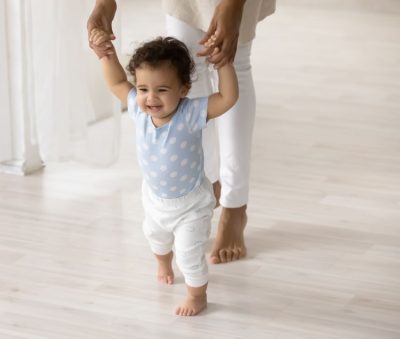Physical development
Physical development is an important part of growing, as children learn to master control of their body.
Physical development includes milestones such as, learning to roll, sit, crawl and stand. It is important to recognise that all children develop at different rates. Activities that will promote development include, plenty of floor play, outdoor activities and being in stimulating environments.
If your child is struggling with a developmental milestone, you may find the below information and links helpful for you and your child.

Gross motor

Supporting my child to develop their gross motor skills
If your child is having difficulty with whole body movements, such as hopping, running or hand co-ordination skills the Occupational Therapy Service for Children and Young People have some guidance on helping to develop your child’s gross motor skills.
Fine motor

Helpful information for parents and carers
Fine motor skills involve the small muscles which work with the brain and nervous system to control movements in areas such as the hands, fingers, lips, tongue and eyes. By developing these fine motor skills your child will be able to perform skills such as eating, writing, manipulating objects and getting dressed.
Advice regarding how to encourage skills such as using cutlery, handwriting and dressing can be found on the Occupational Therapy for Children and Young People pages.
Walking patterns

Walking patterns
From walking on tip-toes, to in-toe walking, out-toe walking and flat feet Children's Podiatry and Children's Physiotherapy give guidance on some of the common gait conditions.
Developmental Delay
Children may be referred to Physiotherapy if they are not meeting their motor milestones. If you are waiting to be seen by Physiotherapy we would encourage you to read through the resources below and practice the advice that best reflects your child’s abilities at their stage.
Please note the age ranges are for a guide only – all children develop at different rates.
0-6 months

Tummy Time Leaflet
Produced by Association of Paediatric Chartered Physiotherapists.

Toys and Play for 0-3 month olds
Leaflet by EiSMART

Toys and Play for 3-6 month olds
Leaflet by EiSMART

Awake Time Ideas
Produced by Association of Paediatric Chartered Physiotherapists.

Sidelying leaflet
Leaflet by EiSMART

Rolling over
Leaflet by EiSMART
6-9 months

Having Fun Sitting
Leaflet by EiSMART

Play Ideas for 6-9 month olds
Leaflet by EiSMART

Ideas for moving from lying to sitting
Produced by Association of Paediatric Chartered Physiotherapists.
9-12 months

Play Ideas 9-12 months
Leaflet by EiSMART
12-24 months

Play Ideas 12-24 months
Leaflet by EiSMART
It is important to remember that not every child will learn to move in the ‘textbook’ way. For example, lots of children bottom shuffle and do not crawl and go straight to standing and walking that way.
A physiotherapist can assess your child to help understand the reason for their delay. The reasons for which will be very individual to your child. However, with experience there are some common reasons which can contribute to your child’s presentation. These include:
- Not having enough time on the floor to practice
- Parents feedback to us that they feel like they are not sure of how to support their child’s motor developments.


